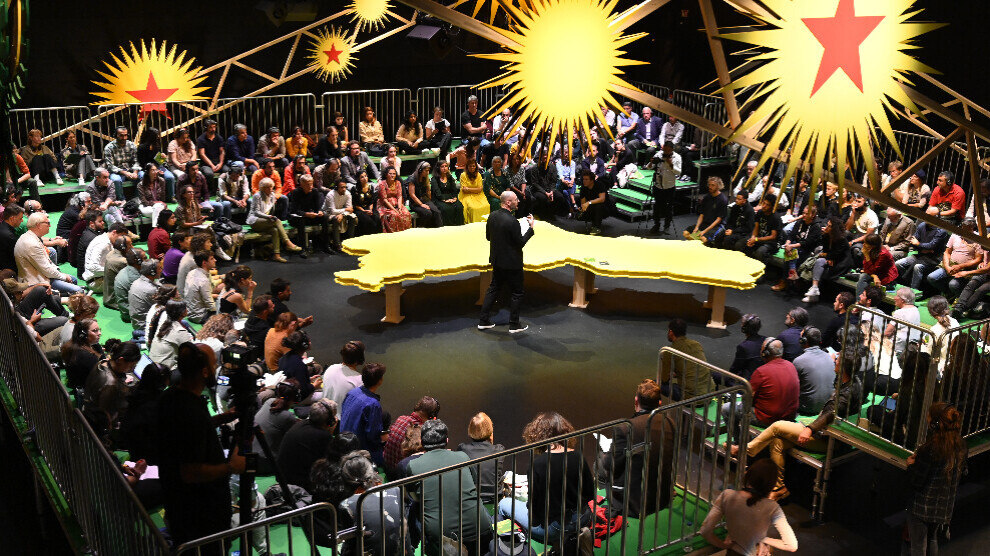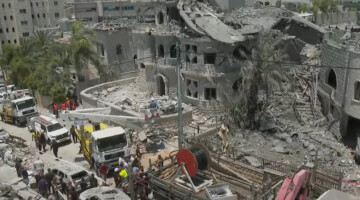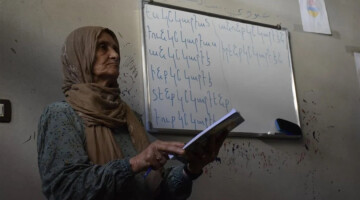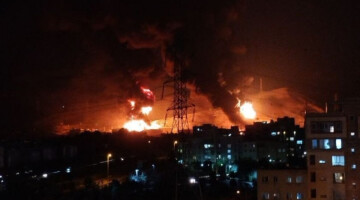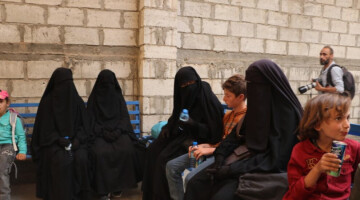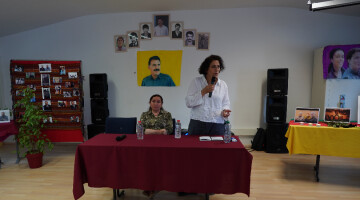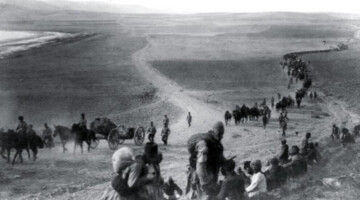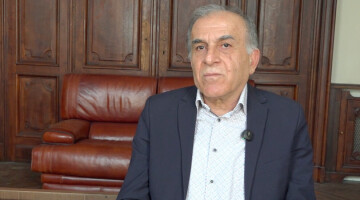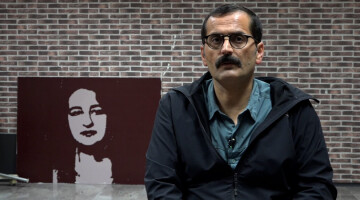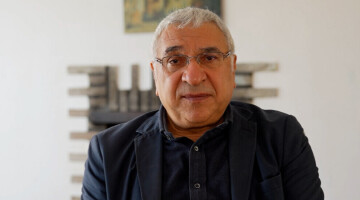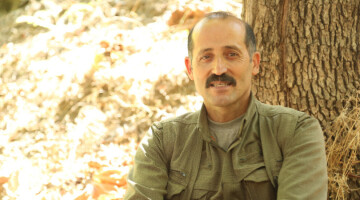The Théâtre de Vidy in Lausanne is considered one of the most important theatres in Switzerland. This weekend it is hosting the "New World Embassy: Kurdistan". The project is curated by historian Nilüfer Koç, representative of the Kurdistan National Congress (KNK), and Dutch artist Jonas Staal. A large-scale artistic installation serves as an alternative message for the Kurdish people. It is intended to provide space for an exchange and discussions on means and forms of democracy without a state, but also on a culture of solidarity and the possibilities of a stateless world democracy.
The first day of the Kurdistan "Embassy" started with a workshop by Nazma Akter, a Bangladeshi trade unionist and founder of the Awaj Foundation. She drew a general picture of the situation of trade unions and workers in Bangladesh. Afterwards, Nilüfer Koç gave input on Democratic Confederalism. Following the ideas of libertarian communalism, the PKK founder Abdullah Öcalan developed this new model of society for the Near and Middle East as a political project of a transnational grassroots democracy in fundamental criticism of the nation state. Gender equality, ethnic inclusion and social ecology are to be achieved through the practice of self-determination and self-management.
Democracy Beyond the State
After the subsequent "opening" of the Kurdish embassy, the first "Diplomatic Circle" took place under the title "Democracy Beyond the State". Nilüfer Koç as well as American economist David Adler and the Swiss human rights activist Elisabeth Decrey Warner delved into the contents of democratic confederalism: How does stateless democracy work? And how does this model relate to and resonate with other democratic and stateless movements around the world? These were the questions that were attempted to be answered.
Many people tend to equate the history of democracy with that of the nation state, but historically, forms of collective governance preceded the state, Koç said. She cited the early matriarchal societies of ancient Mesopotamia as an example. She said that Abdullah Öcalan had built precisely on this heritage when he proposed that the solution for Kurdish society, as the largest nation without a state of its own, was not to create another nation-state but to practise a democracy separate from the state. More precisely, a stateless democracy.
The project of Democratic Confederalism
At this point, the “delegates" came to talk about the Treaty of Lausanne, which gave diplomatic blessing to the quadripartition of Kurdistan a hundred years ago. Kurdistan was placed under the sovereignty of the nation states of Turkey, Iraq, Iran and Syria and thus transformed into an international colony. The project of Democratic Confederalism strives to eliminate precisely this nation-state logic and to achieve social unity in all parts of Kurdistan. Some regions in the north and west have already realised Öcalan's vision of autonomy through local, communal self-government - with a focus on gender equality and the communal economy - but this paradigm has also come to life in Rojhilat (Eastern Kurdistan) and Başûr (Southern Kurdistan). Here, the women's liberation struggle, which is also the basis of the Rojava revolution, is indispensable for its realisation.
'The Kurdish revolution gives hope to the world'
David Adler said it was a great honor and chance for him to be there. “As a researcher, I had the opportunity to research international politics. I was born in the US but grew up in Mexico. It was an honor to see the existence of feminism in Chipas. On the other hand, the Kurdish revolution gives hope to the world today,” said Adler, who made a presentation about international politics after citing examples of women’s struggles in Mexico.
The experience of Rojava
Swiss human rights activist Elisabeth Decrey Warner spoke about her impressions of North-East Syria. Defining the existing democracy in Rojava as a direct democratic system, she stated that: “Rojava has been able to keep many nations together. I met many groups in Africa, who were waging a struggle against those fighting them, but losing many of the values they defended shortly after gaining power. This has not been the case in Rojava, where all the problems in the world, such as the climate crisis and women’s question, remain on the agenda. What impressed me most was the women’s existence within the system and at every center of the system.”
Warner said that another impressing point in North-East Syria was the capability to produce a solution to all problems, and work carried out to this end. “Talking about democracy with or without the state, elections come first. For example, Switzerland is a democratic country, but the voter turnout is very low. Stateless democracy requires hard work because you need to make people believe in it and prepare society for it.”
Stateless Decoloniality
The second "Diplomatic Circle" took place under the heading "Stateless Decoloniality: HerStory (Women's History) and Social Ecology". Speakers included Necîbe Qeredaxî from the Jineolojî Academy in Sulaymaniyah. She described the Kurdish women's movement as a central force in identifying the model of the nation state as a patriarchal, nationalist and capitalist construct. She pointed out that Öcalan powerfully summarised this multi-layered form of oppression when he characterised the family system as a "small state of man" and the nation state itself as a "colony of capital". Qeredaxî pointed out that: “It is necessary to free oneself from the state-oriented mentality that is historically interwoven with colonialism and imperialism. Jineolojî, or the "science of women", is one such attempt to rewrite history as a "her-story" that recounts the experiences and knowledge of women and stateless peoples who remained without institutional recognition for centuries.”
Varsha Gandikota-Nellutla from India, who is coordinator of the Progressive International's Debt Justice Collective and advocates for a new international economic order that meets the needs of working peoples on both sides of the deepening geopolitical divide, and the French-Moroccan political scientist Fatima Ouassak, co-founder of the Paris-based organisation "Front de mères" against discrimination and for better educational opportunities with a focus on connecting mothers of school children in particular, were the two other delegates of the diplomatic circle. They focused on social ecology, recognising the fundamental interconnectedness of human and non-human actors in their common struggle for survival and self-determination, and critiquing the devastating legacy of modernity. How does this decolonial knowledge and practice of the Kurdish movement relate to other social movements and organising work? These were the questions to which they gave answers to the audience.
The day ended with a joint dinner, provided by L'Assemblée des Femmes Kurdes Vaud Lajîn, and a concert with the artists Azad Karahan, Mustafa Kökel, Eser Gül, Mehmet Taş, Mazlum Gül and Deniz Kaya from the "Kulturzentrum Med" association in Basel. Today, the programme continues with an introduction to Jineolojî, a lecture on the topic of self-determination for Western Sahara, a workshop with the Lebanese artist Marwa Arsanios and the diplomatic circles "Culture of Solidarity" and "Democratic World Confederalism".
At the same time, Plateforme 10 will host Jonas Staal's exhibition Stateless States, which imagines a stateless global polity. Through architectural models of alternative embassies and parliaments, maps illustrating the self-determination claims of various stateless movements and videos, Stateless States seeks to liberate us from the traditional notion of the state in favour of a new stateless global culture. The exhibition will remain open until 22 October.

